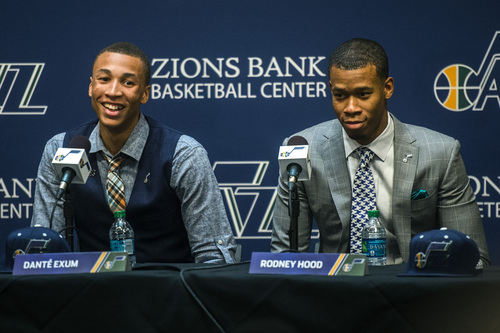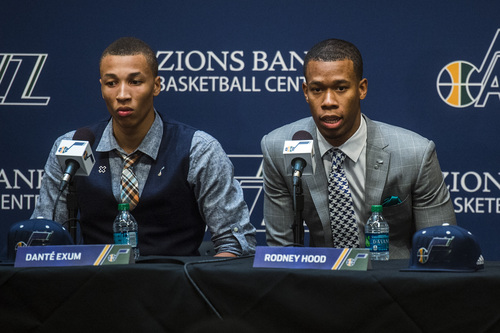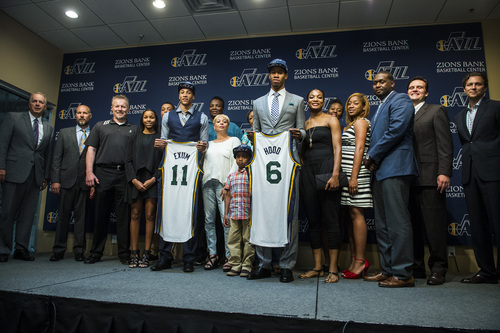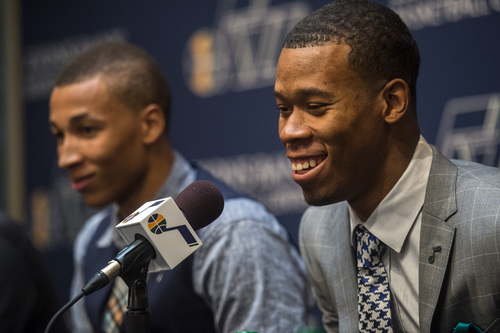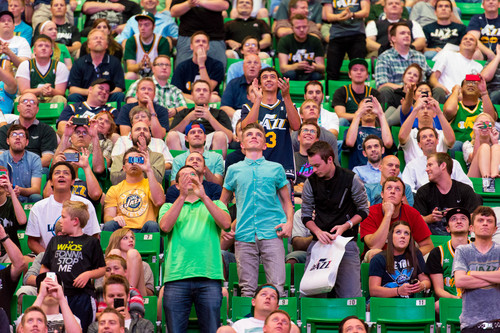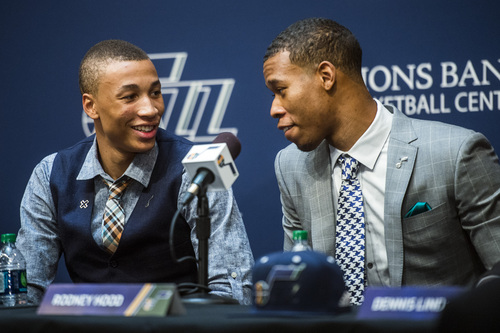This is an archived article that was published on sltrib.com in 2014, and information in the article may be outdated. It is provided only for personal research purposes and may not be reprinted.
When the pingpong balls fell into place, and the Jazz's draft reality became clear, general manager Dennis Lindsey felt the disappointment.
For months, experts had identified four players with the potential to truly be franchise-changing players. And the Jazz would pick fifth.
"In the lottery ball room it took 10-15 minutes," Lindsey said last month, "but then you start to get resolute about the job you have."
This week, after months of scouting — and a dose of good luck — the Utah Jazz saw a dream draft scenario play out.
Dante Exum was the third best player on the board in the Jazz draft war room. So Lindsey and team officials seemed to almost be fighting back grins of delight this week as Exum was introduced in Salt Lake City, having fallen to the Jazz at five.
"We couldn't be happier with the outcome," Steve Miller, president of Miller Sports Properties, said.
For the second year in a row, Lindsey and his staff got their guys.
Last year, in a weaker draft, the Jazz dealt away draft picks to move up to grab point guard Trey Burke and more assets later to move back into the first round to take center Rudy Gobert.
This year, in a substantially deeper class, success didn't cost the Jazz a thing.
Exum fell to five and then the Jazz watched as Duke forward Rodney Hood (the 15th best prospect on the team's board, according to one ESPN report) fell to them at No. 23.
So far, the reviews have raved. In the game of instant draft analysis and grades, the Jazz were among the honors students Thursday night.
The Jazz addressed needs while sticking to their policy of taking the best available player.
Exum comes to Utah shrouded by the mystery of being an 18-year-old international who hasn't played major competition in over a year. But for a market that has struggled luring big-time free agents, taking Exum in the draft brings the possibility of true star power.
Exum is big — 6-foot-6 with a 6-9 wingspan — and he's fast.
And the Jazz believe he can play with the guards already on the roster.
"There are players more ready to contribute in the short term, but we felt like long term he could play with Trey," Lindsey said, "he could play with Alec [Burks], and that three-guard rotation could be somewhat unique and very talented."
Exum needs to get stronger and improve his perimeter shooting; in the FIBA U-19 championships, he hit one-third of his 3-pointers.
There's not a huge body of work to judge Exum on at this point. But Jazz scout Rich Sheubrooks, who organizes the Nike Hoops Summit, and other scouts in the organization are extremely high on his potential.
Exum's ability to get to the rim and finish should be better than Burke's because of his size. And while he must still improve defensively, he has the size and speed to be an elite perimeter defender.
But Exum is just 18, and Lindsey cautions, "It's a project pick. It's an anticipation pick."
In Hood, the Jazz got what some have called the steal of the draft.
The Duke forward didn't work out for a team with a pick outside of the top 18 — and that's just because the Phoenix Suns also owned the No. 14 pick in the draft.
Hood was surprised by his fall, which could have come in part because of his defensive deficiencies, but the Jazz will be happy to have him. Hood, a 6-foot-8 small forward, averaged 16 points a game for the Blue Devils.
He's a left-hander with a pure shooting stroke, who hit 42 percent of his 3s last season. The Jazz had only one player who shot better than 40 percent from 3 last year: 34-year-old free agent Richard Jefferson.
The Jazz deservedly received "A" grades from a number of draft experts.
"I want the fans … to be excited about what we did," Lindsey said. "I think we did some good things. But really, the evaluation will be years from now on how Dante develops and how Rodney contributes."
Twitter: @tribjazz


